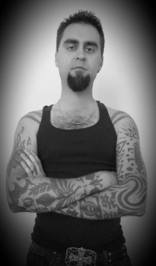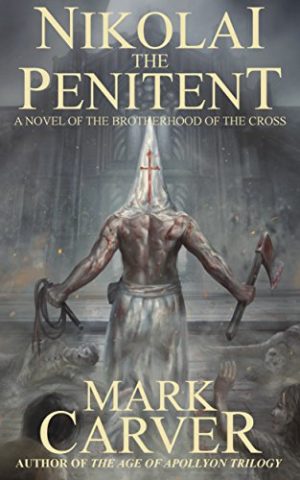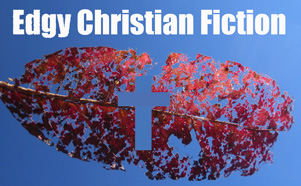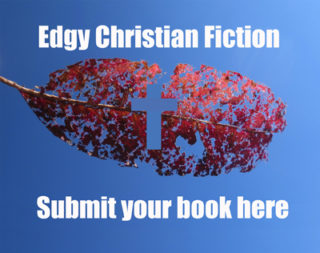I came across the author of today’s interview about 4 yeas ago after being intrigued by his first novel, The Age of Apollyon. I loved this novel and had found another author to add to my increasing favourite author list. Since then, Mark Carver has been prolific in his writing and has set himself a goal of publishing 30 novels in his lifetime. His latest novel, Nikolai the Penitent: A Novel of the Brotherhood of the Cross, is about to be released on July 26th. It is a very unique, different novel, dark, brutal, gritty and disturbing, set in a time in history of spiritual darkness. It is because of this, and having read it, that I decided to find out more about this novel, its author, and what led to it being written.
So sit back, relax and let Mark Carver, talk about his life as an author and this latest novel.
Mark, thanks for stopping by. Let’s start by you telling us a little about yourself.
Thanks Peter.
 My name is Mark Carver and I live in Atlanta, GA with my wife and three children, I previously spent more than eight years in China. I graduated from Toccoa Falls College in 2005 with a B.A. in English. Currently, I am currently an ESL teacher.
My name is Mark Carver and I live in Atlanta, GA with my wife and three children, I previously spent more than eight years in China. I graduated from Toccoa Falls College in 2005 with a B.A. in English. Currently, I am currently an ESL teacher.
I have written seven novels and several short stories. My novels are dark and edgy that tackle tough spiritual issues. I am currently working on my next novel. Besides writing, I am passionate about art, tattoos, heavy metal, and medieval architecture.
What inspired you to become an author?
I’ve been writing since I was a small child, but I became serious about writing about five years ago. I hadn’t written anything for years, but there was a story welling up inside of me for a long time, and one day, I decided to let it out (The Age of Apollyon). I haven’t looked back since.
How did you develop your books, by extensively plotting (plotter), or as it came to you (pantser, that you write by the seat of your pants) or was it a bit of both?
Definitely a pantser. I write a collection of story ideas and character profiles in a separate document, but when I write, I don’t use an outline or any plotting software. I just write scene by scene.
How has writing and being an author impacted your relationship with Jesus Christ?
I have explored many themes that I didn’t give much thought to before, and every book I write deals with some issue in my own life or something that I was wrestled with. My latest book, Nikolai the Penitent, is definitely the most “spiritual” book I’ve written, but there are biblical principles and personal issues in all of my stories.
Do you have a favourite genre that you read?
I love the classics, particularly medieval and Victorian-era stories. Dante Alighieri, Bram Stoker, and Edgar Allan Poe are some of my favorite authors.
What have you learnt about becoming an author?
Try to write as regularly as possible, only line, paragraph, page, and chapter at a time. Patience and persistence are just as important as inspiration.
You write well. Have you always found this to be an easy feat? Some authors such as Tom Pawlik engaged in a writing course with popular and prolific Christian author Jerry B Jenkins before they wrote their first novel. What have done? Would you encourage other budding authors to do so?
Writing isn’t the “struggle” for me that it seems to be for some other writers. I’ve never had writer’s block, and it’s never taken me ages to write a story. Hopefully my good luck continues 🙂
How do you come up with the character names in your books?
I don’t really know. Just whatever feels right. I try to avoid names that sound like they were made for a book (“Dirk Pitt,” “Jack Ryan,” “Alex Cross,” etc.).
Have you ever written people you know as characters in any of your books?
I’ve used real people’s names for characters that were nothing like them, and I’ve used attributes from real people and changed the names, but I’ve never written a real person into a book.
When did you decide to make a career of writing?
When I started my second book 🙂
What do you do when you are not writing?
Working, hanging out with my family, reading books and watching TV, and thinking about writing.
Is anything in your books based on real life experiences or purely all imagination?
Many of the issues my characters face are based on my real-life experiences but the stories are from my imagination.
What is the best piece of advice you ever received from another author?
Two writers (both now deceased) gave me two pieces of advice that have stuck with me: Write emotively, and write the kind of books that you want to read.
What are you reading right now?
Black Earth: Broken Daisy by David Alderman
Do you ever suffer from writer’s block? If so, what do you do about it?
Never full-on writer’s block. There have been times when I didn’t know where to go next, so I wouldn’t write for a couple of days, and then I would know, so I would get back to it.
What tools have you found most successful in advertising/marketing yourself and your books?
I find Facebook the easiest and most enjoyable. Twitter and Instagram are good but feel limited.
Now Let’s Talk About Nikolai The Penitent (NtP):
Before we begin, my apologies if some of these questions seem negative or critical, not intending them to be, they are just in response to this novel being dark and not your typical Christian fiction novel, not even typical of what you would expect in the genre of edgy Christian fiction; and also it being set in a time of spiritual darkness with its many atrocities and horrors, including the mistreatment and persecution of the Jewish population in Europe.
How long did it take you to write this novel?
 One year for the first draft, then a few months of editing after that.
One year for the first draft, then a few months of editing after that.
What obstacles did you encounter in this endeavour to write NtP? How did you overcome these?
I had never written a book in this setting before so I had to do a lot of research before I could even begin. It was fascinating, though, to learn about this medieval world.
What was the motivation or inspiration to write NtP?
I downloaded a free e-book from Project Gutenberg called The Black Death and the Dancing Mania, written in the 19th century. When I came across a passage about the Flagellants, I immediately knew that I wanted to write a book about these people.
From my study of European history in secondary (high) school, the plague you describe would be the bubonic plague or Black Death as it was known then, and the disease the Nikolai’s mother dies from would be tuberculosis. Am I correct on these two accounts?
The Black Death was the bubonic plague, and I never determined what disease it was that killed his mother, but tuberculosis would be the most probably cause.
It is a well known fact that every author needs to include some poetic licence to their novels. You have portrayed the flagellation practice with great intensity and graphically. Was this to increase the suspense and drama for the plot or is this a direct portrayal of your research?
Both. The accounts I read described very brutal and vicious scenes of self-abuse, but in order to immerse the reader in this world, I wanted to paint a very vivid picture for them.
Following on from the previous question, you have Nikolai flagellating himself from early morning to dusk most days describing a lot of blood loss from Nikolai’s body on a daily basis. Based on the fact that the total blood volume for an average 70 kg human (150 pounds) is approximately 5.5 liters (or a little more than 5.5 quarts, (this can vary depending on various factors) in their blood, Nikolai would have suffered from chronic anaemia and its associated serious health problems and together with the lack of food that you have portrayed, he (and his members of the Brotherhood) would have been malnourished as well, which also has serious health issues. From my Nursing background I found the description of this chronic blood loss and malnourishment just a little hard to believe or have much credibility. Did you include the physical/medical side of the effects of flagellation (such as I have mentioned here) on the human body in your research? I ask this as I am sure many readers might come to this conclusion as well.
I did consider this, but I didn’t want to spend too much time on the medical minutae of the story because that would drag it down. I do describe the incredible fatigue suffered by the flagellants, but I also hint at supernatural sustenance that allows Nikolai in particular to endure more than would seem humanly possible.
What sort of criticism or feedback are you expecting from the sex scene you have included? I did not consider it too graphic and I can see why you included it as you have, to show the intense struggle of sexual temptation when one believes that any sexual activity outside marriage is spiritual impurity (sin) and therefore not receive the favour of God or freedom from this plague. Do you think you could have achieved the same effect or outcome without the graphics of this scene?
I expect some people to be critical, and I definitely wrestled with this scene and how much to describe, but because it is such a crucial scene in the story, I didn’t want to rush through it. Hopefully it won’t be an issue with too many people.
The subtitle of this novel is “Salvation must be paid in blood”. The Bible states that this was achieved by Jesus’ death on the Cross, but your research, as portrayed by this flagellation practice of the members of the Brotherhood of the Cross was a common event. Was the truth of salvation not taught in the Church in the 1300s? I ask this as I believe that the majority of Christians would not know if this was or was not taught in this era unless they have studied Church/bible history formally or informally. Were you surprised at this as well?
The book takes place in the Dark Ages, and most people were spiritually ignorant beyond what the church taught them. The church in this story is very “Catholic” in that works are required for salvation, more than just faith in Christ and His death and resurrection. Monetary penance, pilgrimages, and self-abuse were lauded by the church as means to achieve salvation, and the church in those days wanted to maintain power over the people as much as possible, and these “extras” were an easy way to do this.
You state in the Author’s Note that there were times when you would feel physically nauseous after writing some of the more gruesome scenes. Do you feel that readers might be turned off finishing this novel once they experience these scenes or not recommend it to others?
I hope not, but I understand if they might.
Many times during this novel Nikolai hears a voice encouraging him, other times condemning him, judging him and one time you have this voice as his conscience. I found this a bit confusing working out the origin of this voice.
This is a frequent technique that I employ in my writing, hearing the character’s thoughts. The voice is Nikolai’s conscience but its tone changes as times as Nikolai draws nearer or further from God.
Nicolai interprets the presence of the crow as a symbol or sign of demonic influence on his life and ministry. Why did you include this?
It was an easily understood visual metaphor, and it also makes the evil external, since there isn’t a “bad guy” per se in the story.
What take home message do you want readers of NtP to embrace?
That salvation is indeed paid in blood, but Christ’s blood, not ours. There is absolutely nothing we can do to earn God’s forgiveness.
Anything else you would to say about NtP?
I hope you pick up your copy when it comes out on July 26th.
I really enjoyed a radio interview you participated in on 19th July where Parker J Cole discussed with you about NtP where you were able to expand more on the themes of this novel. I have included the link below in case anyone reading this wants to investigate in more detail about NtP and more of what you have discussed here in this interview:
The Write Stuff With Parker J. Cole/Nikolai The Penitent
What’s next, do you already have a new project in the works?
I am working on a mixed martial arts/Mississippi hoodoo story called Balor. It should be ready early next year.
Where can readers find you?
Website: http://www.markcarverbooks.com
Facebook: http://www.facebook.com/markcarverbooks
Twitter: http://www.twitter.com/markcarverbooks
Goodreads: https://www.goodreads.com/author/show/6152317.Mark_Carver
Amazon: http://www.amazon.com/-/e/B008R3AZKC
Any closing comments?
Thanks Peter for this opportunity to talk about myself and my books.
It is my pleasure Mark! I pray that our discussion will give readers a greater understanding of the background of your new novel.
If you are interested in purchasing Nikolai the Penitent, it is already available for pre-order on Amazon and its release date is July 26th.
Peter Younghusband has been an avid reader from as early as he can remember. Since becoming a Christian in his early 20s, his passion for reading led to specifically Christian fiction and this has developed into reviewing them on his blog. He loves reading new author’s novels or authors who have not had many reviews or exposure and giving them much needed encouragement where appropriate.


